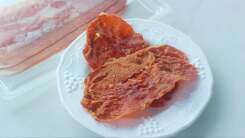How to Line a Tart Shell Without Poking Holes in It
Tarts are the rich, European great-aunt of the American dessert pie. Dainty, refined, understated, and a little pretentious, usually boasting ingredients so rich that a tiny sliver is all you need. You can bet that the scalloped crust of such a tart is super tender and crumbly, too. Besides flavor and texture, part of the tart’s allure is that you get to skip the hassles that are part and parcel to thin pastry crusts—tears and holes that lead to patchwork corrections, or worse, to re-rolling. But the tart pan, with its sharp metal edge and awkward right angle, makes it challenging to achieve the perfect shape without ripping the dough.
If you’re familiar with lining pies or tarts with pastry crust, you know that rolling out the dough to the perfect thickness and transferring that finicky sheet over onto your pan isn’t easy. To make matters worse, a tart pan has some beautiful, yet tricky, features—fluted ridges and a sharp metal edge—that certainly serve a purpose, but can be hard to work with. Pressing into that little corner to mold the tart’s edge sounds easy enough: Just use your finger tips to coax the crust into making contact with the pan! Sadly, this is an almost surefire way to get the dreaded fingernail marks. (Yes, even you, short fingernails.)
While you can probably get away with very light marks, you risk a fingernail poking all the way through the thin pastry. Some types of dough are forgiving, but our goal is to keep the pastry in one piece, devoid of rips and with a tiny bit of excess dough to trim off. Any damage can lead to filling leaks and soggy crust, while over-stretching can lead to shrinkage during the blind-baking stage. We also want to avoid re-rolling the dough at any cost; overworked pastry leads to stronger gluten bonds, and that makes for a tough crust. (Our great-aunt would never approve.)

To prevent fingernails from gouging your tart shell, you need make a little dough finger. Gather up a small blob of excess dough, around the size of a golf ball (either some you discarded or a small bit of overhang that you can spare). It won’t be added back in, so make sure you can do without it. Smoosh this extra crust up and shape it into something of a chubby thumb, or a short hot dog. Hold it with your fingertips, and use this dough finger to press the pastry into the corner of your tart shell. The dough is sturdy yet pliable, strong enough to press the shell firmly into the corner, and scalloped side mold, but not so stiff that it will cause damage. The scrap will eventually lose its hot dog shape, and that’s fine—just take a moment and smoosh it back into shape, then proceed to finish fitting your tart’s crust.
If you have absolutely no extra dough to spare, you can use something similar in shape and feels, like the center of some soft bread or maybe a jumbo marshmallow. I haven’t personally tried those two, but I have a good feeling about them. Although it’s tempting, avoid using a measuring cup unless you’re excessively gentle, and somewhat familiar with pastry work. The right angle base is helpful, but it’s all too easy to press through into the side ripple, exposing the metal. Whatever you use, keep your fingernails out of there.
RECOMMENDED NEWS

What Foods Should Be Forever Banned From the Thanksgiving Dinner Table?
2025-10-14

What Thanksgiving Sides Are Non-Negotiable?
2025-10-17

13 Foods That Should Be Banned From the Thanksgiving Dinner Table, According to Lifehacker Readers
2025-10-14

Turn Your Leftover Holiday Cheeseball Into Gooey Mac & Cheese
2025-10-18

How to Use Up Leftover Fish Without Causing a Stink
2025-10-15

Why Your Chili Needs a Little Pepper Jelly
2025-10-15
Comments on "How to Line a Tart Shell Without Poking Holes in It" :